|
|
|
Sort Order |
|
|
|
Items / Page
|
|
|
|
|
|
|
| Srl | Item |
| 1 |
ID:
175524
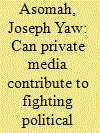

|
|
|
|
|
| Summary/Abstract |
In sub-Saharan Africa, the private media are often considered corrupt and thus incapable of performing critical watchdog functions. Using the Ghanaian case, the objective of this study is to examine how the private media contribute to exposing political corruption and demanding accountability. Based on the media-as-a-watchdog theory and on primary and secondary data, this article argues that private media outlets make significant contributions to the fight against political corruption. In-depth, semi-structured interviews were used to collect primary data in Ghana. Relevant secondary data from media reports and scholarly work supplement the primary data. The research findings show that Ghanaian private media address political corruption through investigative reporting, agenda-setting, providing a forum for anti-corruption discussions, and acting as a pressure group for institutional and legal reforms as well as political accountability. This article thus questions the popular claim that in sub-Saharan Africa, the private media cannot contribute meaningfully to combatting corruption involving influential political actors. Policy and future research implications are presented in the conclusions.
|
|
|
|
|
|
|
|
|
|
|
|
|
|
|
|
| 2 |
ID:
175528
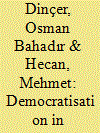

|
|
|
|
|
| Summary/Abstract |
Instead of writing off the post-uprising period in the Middle East and North Africa (MENA) as a failed attempt at democratisation, this article argues that the region is still undergoing an ambiguous and contingent process in which democratisation survives as one likely path among others. From this alternative viewpoint, the uprisings have multi-faceted, complex and uncertain consequences that constitute the beginnings of a long-term transitional phase in which various forces of political development continue to coexist in competing fashions. We argue that amidst this ambiguous process, the uprisings have introduced game-changing dynamics with regard to democratisation. We further attempt to identify these dynamics and discuss the potential value of the post-uprising experience as an asset for regional democratisation. For this purpose, we underline at least three crucial aspects of the post-uprising experience regarding democratic development in the region: (1) the demonstration of the potential for political change, (2) the contribution to the democratic learning curve, and (3) the emergence of Tunisia as a ‘transition game’. This study aims to serve as a guiding analytical exercise in the study of democratisation within ambiguous political environments, such as the post-uprising MENA region, where identifying the direction of democratisation may prove difficult.
|
|
|
|
|
|
|
|
|
|
|
|
|
|
|
|
| 3 |
ID:
175527
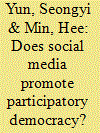

|
|
|
|
|
| Summary/Abstract |
This study examines whether social media contributed to the success of the Korean presidential impeachment protests of 2016–17 and promoted participatory democracy. The 2016–17 candlelight protests contributed to the overthrowing of a corrupt regime. However, was it a victory of participatory democracy? To answer this question, we must first be clear on what kind of participatory democracy is being referred to. Therefore, while social media played a crucial role in the success of the protests, the impact of social media on participatory democracy should be addressed separately. For this purpose, we first analyse the contributions of the digitally connected movements during the 2016–17 protests with two social movement theories: resource mobilisation and collective identity. Second, we examine whether the success of digitally connective movements during those protests promoted participatory democracy. To discuss this issue, we use Arnstein’s concept of a ‘ladder of participation’, which describes participatory democracy as falling within three levels, from non-participation through tokenism to citizen power. This study shows that the proliferation of social media politics by itself does not convert representative democracy into participatory democracy. This implies that even if social media augments citizens’ power of resistance, it cannot transform citizens into a governing power.
|
|
|
|
|
|
|
|
|
|
|
|
|
|
|
|
| 4 |
ID:
175525


|
|
|
|
|
| Summary/Abstract |
This article examines why the emancipation of ethnic groups has failed to address ethnic conflicts in Uganda. Successive Ugandan governments, especially the current regime of President Yoweri Museveni, have attempted to end the country’s history of ethnic strife by creating separate constituencies, separate districts and separate kingdoms for marginalised ethnic groups to free them from the domination of powerful ethnic groups. Focussing on the Rwenzori area of western Uganda where ethnic violence is severest, I show how the approach of ethnic emancipation reproduces ethnicity as the basis for political inclusion and escalates rather than abates ethnic contestations. This study should shed more light on the challenge of ethnic federalism in other countries like Ethiopia and Nigeria.
|
|
|
|
|
|
|
|
|
|
|
|
|
|
|
|
| 5 |
ID:
175523
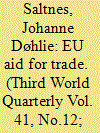

|
|
|
|
|
| Summary/Abstract |
Does the EU’s Aid for Trade (AfT) initiative contribute to global justice? Complementing work that considers distributive justice, in this paper we adopt the central tenets of the republican theory of non-domination as a regulative ideal for justice in international relations. We evaluate the extent to which the EU’s AfT initiative results from reduced political domination in international trade negotiations, and if that then mitigates economic dependency between European and African states. We first provide a qualitative account of the processes that led to the establishment and subsequent development of AfT. We then consider the extent to which the AfT has promoted the reliance of African states on European foreign direct investment (FDI) relative to FDI from other regions (including and especially from within Africa itself) using subnational, project-level, data. Our findings suggest that EU AfT does not reinforce dominating forms of dependency in the international arena, at least when measured by the source of the FDI that it attracts, while AfT is itself an outcome of somewhat less dominating power relations in trade negotiations between wealthier and poorer states.
|
|
|
|
|
|
|
|
|
|
|
|
|
|
|
|
| 6 |
ID:
175530


|
|
|
|
|
| Summary/Abstract |
Community radio in India operates within a clear framework of development. This calls into question the fundamental purpose of community radio: communication rights, activism, voice, community participation or development? Drawing on ethnographic research conducted at two rural stations in South India, this research explores the influence of a pervasive development discourse on the grassroots activities and functions of community radio. The starkest example of this was observed through the far-reaching influence of the Government of India’s highly publicised sanitation programme, the Swachh Bharat Mission. This programme represents a pervasive example of the modernisation paradigm in development communication, yet it was found to proliferate throughout community radio, a medium more often associated with participatory communication. This development discourse was found to profoundly impact the way both broadcasters and audience members engage with and experience community radio. The findings highlight a disconnect between the theoretical and ideological frameworks of community radio and the ways in which a development discourse operates through the stations at the grassroots level. As such, this article argues that community radio in India represents a liminal space where multiple development communication paradigms interact and compete with the theoretical underpinnings of the movement.
|
|
|
|
|
|
|
|
|
|
|
|
|
|
|
|
| 7 |
ID:
175526


|
|
|
|
|
| Summary/Abstract |
In the last few years, several African countries have witnessed an increase in conflict between pastoralists and sedentary farmers and among pastoralist groups. While issues such as climate change, desertification, regional conflicts, population expansion, trafficking and terrorism have been highlighted as the reasons for the surge in violence, none of these issues fully explain the increased use of small and light weapons by several pastoralist groups and sedentary farmers. This article explores the changes in the dynamics of cattle ownership, termed neo-pastoralism, as a possible explanation for the increase in armed clashes between the groups. The article explains how traditional pastoralism is gradually giving way to neo-pastoralism, a form of pastoralism which involves larger herds and increased use of arms and ammunitions. Nigeria is used as a case study to explore these new patterns of conflict due to having the largest number of cattle in the sub-Saharan Africa region and the scale of the conflict in the country. This article is based on field research and interviews carried out in Nigeria between 2013 and 2019.
|
|
|
|
|
|
|
|
|
|
|
|
|
|
|
|
| 8 |
ID:
175522


|
|
|
|
|
| Summary/Abstract |
This paper examines the influence of developing countries during the construction of international institutions that govern the global commons. It argues that developing states are empowered by the problem structure of commons issues because the latter’s management requires universal participation. This allows developing states to employ their large numbers to shape institutional outcomes in two ways. First, they can leverage non-participation when the need for commons management arises, threatening the long-term viability of a valued good unless their demands are met. Second, developing states can utilise their majority status in the international venues through which commons issues are addressed to advance their preferred policies. A case study on the Third United Nations Convention on the Law of the Sea, followed by brief comparisons to the creation of the focal institutions for ozone and climate governance, illustrate the argument.
|
|
|
|
|
|
|
|
|
|
|
|
|
|
|
|
| 9 |
ID:
175531
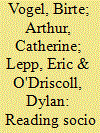

|
|
|
|
|
| Summary/Abstract |
This paper argues that graffiti can provide a form of socio-political commentary at the local level, and is a valuable, yet often overlooked, resource for scholars and policymakers in conflict-affected societies. Graffiti, in its many forms, can provide rich insight into societies, cultures, social issues, trends, political discourse, and spatial and territorial identities and claims. Thus, this, paper suggests that graffiti is a valuable source of knowledge in societies undergoing social and political transformation, to hear the voices of those often left out from the official discourses. Despite advances in the field of arts and international relations and the focus on the local and the everyday, peace and conflict scholarship and policy still lack systematic engagement with arts-based contributions and how to read them. The paper attempts to address this gap by outlining four core dimensions to consider when attempting to interpret and decode graffiti: the spatial, temporal, political economic and representative dimensions. This can also be viewed as an inquiry into the where, when, who and what. These four elements make up an analytical guide and enable scholars to better understand graffiti, and its political meaning and messaging.
|
|
|
|
|
|
|
|
|
|
|
|
|
|
|
|
| 10 |
ID:
175529
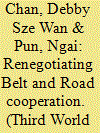

|
|
|
|
|
| Summary/Abstract |
In what way can societal actors in transitional polities play a role in influencing bilateral economic agreements? Societal actors are often ignored in the state-centric international relations literature. We, however, contend that social resistance to a foreign development project can reshape the international outcome, even under an asymmetric bargaining structure, if two conditions are met: the host country’s policy options are conditioned by citizens’ resistance; and the home country is eager to continue cooperation. To make this argument, this paper examines the social resistance to the China-backed Letpadaung copper mine in Myanmar amid the host country’s democratisation. Employing a process-tracing technique and drawing upon extensive interviews from 2015–2019, official documents and secondary data, we argue that a popular anti-mining movement transformed a previous state-to-state bargaining process into a two-level game negotiation. As a result, the rise of societal actors was able to disrupt project implementation and extract concessions from China in exchange for project resumption.
|
|
|
|
|
|
|
|
|
|
|
|
|
|
|
|
|
|
|
|
|